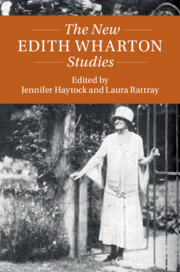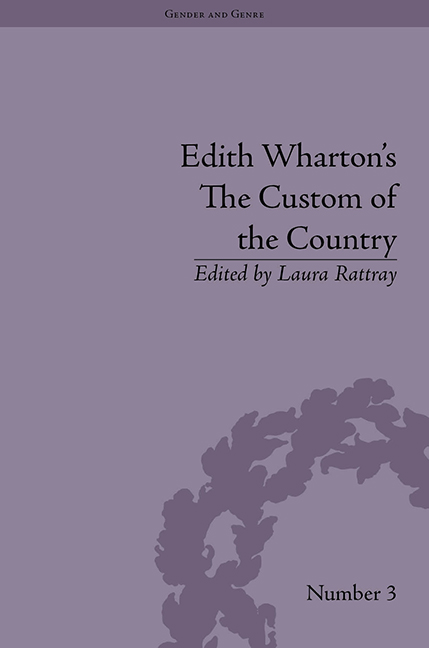65 results
Part III - Wharton on the Margins
-
- Book:
- The New Edith Wharton Studies
- Published online:
- 28 November 2019
- Print publication:
- 19 December 2019, pp 111-172
-
- Chapter
- Export citation
Acknowledgments
-
- Book:
- The New Edith Wharton Studies
- Published online:
- 28 November 2019
- Print publication:
- 19 December 2019, pp xi-xi
-
- Chapter
- Export citation
Bibliography
-
- Book:
- The New Edith Wharton Studies
- Published online:
- 28 November 2019
- Print publication:
- 19 December 2019, pp 231-246
-
- Chapter
- Export citation
Notes on Contributors
-
- Book:
- The New Edith Wharton Studies
- Published online:
- 28 November 2019
- Print publication:
- 19 December 2019, pp vii-x
-
- Chapter
- Export citation
Contents
-
- Book:
- The New Edith Wharton Studies
- Published online:
- 28 November 2019
- Print publication:
- 19 December 2019, pp v-vi
-
- Chapter
- Export citation
Part IV - Sex and Gender Revisited
-
- Book:
- The New Edith Wharton Studies
- Published online:
- 28 November 2019
- Print publication:
- 19 December 2019, pp 173-230
-
- Chapter
- Export citation
Part I - Self and Composition
-
- Book:
- The New Edith Wharton Studies
- Published online:
- 28 November 2019
- Print publication:
- 19 December 2019, pp 13-62
-
- Chapter
- Export citation
Copyright page
-
- Book:
- The New Edith Wharton Studies
- Published online:
- 28 November 2019
- Print publication:
- 19 December 2019, pp iv-iv
-
- Chapter
- Export citation
Introduction
-
-
- Book:
- The New Edith Wharton Studies
- Published online:
- 28 November 2019
- Print publication:
- 19 December 2019, pp 1-12
-
- Chapter
- Export citation
Chapter 7 - Edith Wharton’s Unprivileged Lives
- from Part III - Wharton on the Margins
-
-
- Book:
- The New Edith Wharton Studies
- Published online:
- 28 November 2019
- Print publication:
- 19 December 2019, pp 113-128
-
- Chapter
- Export citation
Part II - International Wharton
-
- Book:
- The New Edith Wharton Studies
- Published online:
- 28 November 2019
- Print publication:
- 19 December 2019, pp 63-110
-
- Chapter
- Export citation
Index
-
- Book:
- The New Edith Wharton Studies
- Published online:
- 28 November 2019
- Print publication:
- 19 December 2019, pp 247-262
-
- Chapter
- Export citation
Editions and Abbreviations
-
- Book:
- The New Edith Wharton Studies
- Published online:
- 28 November 2019
- Print publication:
- 19 December 2019, pp xii-xiv
-
- Chapter
- Export citation

The New Edith Wharton Studies
-
- Published online:
- 28 November 2019
- Print publication:
- 19 December 2019
Editorial Note
-
- Book:
- Edith Wharton's The Custom of the Country
- Published by:
- Pickering & Chatto
- Published online:
- 05 December 2014, pp vii-viii
-
- Chapter
- Export citation
Acknowledgements
-
- Book:
- Edith Wharton's The Custom of the Country
- Published by:
- Pickering & Chatto
- Published online:
- 05 December 2014, pp vi-vi
-
- Chapter
- Export citation
Frontmatter
-
- Book:
- Edith Wharton's The Custom of the Country
- Published by:
- Pickering & Chatto
- Published online:
- 05 December 2014, pp i-iv
-
- Chapter
- Export citation

Edith Wharton's The Custom of the Country
- A Reassessment
-
- Published by:
- Pickering & Chatto
- Published online:
- 05 December 2014
-
- Book
- Export citation
List of Figures
-
- Book:
- Edith Wharton's The Custom of the Country
- Published by:
- Pickering & Chatto
- Published online:
- 05 December 2014, pp xiii-xiv
-
- Chapter
- Export citation
Index
-
- Book:
- Edith Wharton's The Custom of the Country
- Published by:
- Pickering & Chatto
- Published online:
- 05 December 2014, pp 193-198
-
- Chapter
- Export citation



